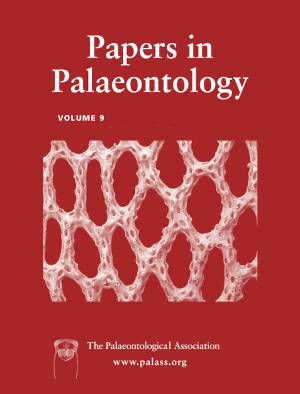Article: A unique Late Cretaceous fossil wood assemblage from Chilean Patagonia provides clues to a high-latitude continental environment
Publication: Papers in Palaeontology
Volume:
9
Part:
6
Publication Date:
2023
Article number:
e1536
Author(s):
Leandro C. A. Martínez, Marcelo Leppe, Leslie M. E. Manríquez, Juan Pablo Pino, Cristine Trevisan, Joseline Manfroi, and Héctor Mansilla
DOI:
10.1002/spp2.1536
Abstract
Abstract Fossil plants, including large trunks, stems, some branches, and twigs, were collected from the Maastrichtian (68.9 Ma), upper Dorotea Formation in the Magallanes–Austral Basin, 16 km north of the Cerro Guido–Las Chinas complex in the southern Chilean Magallanes region. These fossil trunks range from 0.2 to 2.2 m in length. Petrographic slides were made in three sections (transverse, radial and tangential) and analysed under a light microscope to study the permineralized fossils. The woods and stems belong to Austroginkgoxylon gen. et sp. nov., Agathoxylon antarcticum, Podocarpoxylon paradoxi sp. nov., Podocarpoxylon mazzonii, Palmoxylon subantarcticae and Notomalvaceoxylon magallanense gen. et sp. nov. The growth rings of gymnosperms and anatomical characters of angiosperms were analysed to obtain palaeoecological data. Interactions between gymnosperm roots growing into the secondary xylem of an angiosperm (nurse logs) are recorded. The data obtained from the fossil woods suggest warm and humid conditions in this southern South American locality during the Late Cretaceous, providing a unique opportunity to study continental environments at high southern latitudes, which are poorly represented on a global scale.
